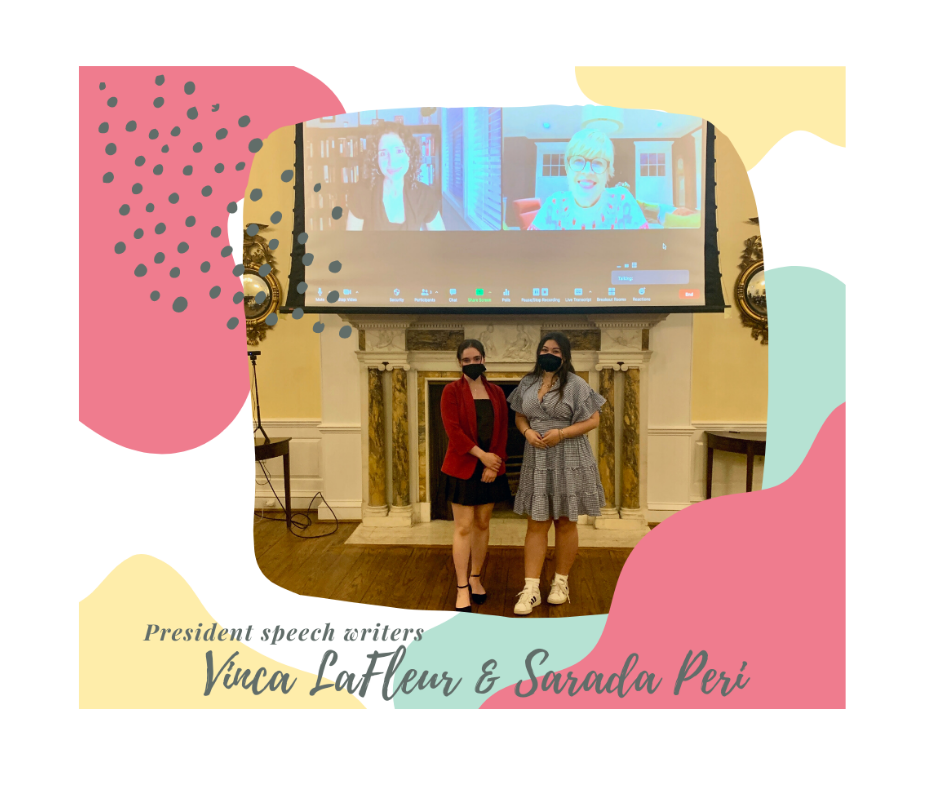On March 24th, former President speech writers Sarada Peri and Vinca LaFleur spoke with the Women’s Leadership Program about their careers and gave helpful advice about the reality of making a name for yourself in the career path you desire. WLP students shared how they felt about this inspiring symposium in a series of reflections.
“During our symposium with Sarada and Vinca, I felt inspired by the story Sarada told us about one of her most memorable days working in the White House. I was extremely impressed by her ability to write four completely different speeches based on the four possible outcomes of the legalization of same-sex marriage in all 50 states. Sarada said it felt really amazing to write the speech President Obama gave to celebrate the legalization and she said it was really cool to feel like a small part of such a monumental day. I was inspired by this story because it showed how Sarada is a leading woman in her industry and she had such a unique power when she worked in the White House.
Words have a lot of power to change the way we think. I specifically think speeches and music are the most powerful. There are many different ways to give a speech, sometimes they are not planned while other times someone could have weeks to prepare a speech. When you have a long time to convey a message, you are able to craft and mold the words into a message that will resonate with many people. When I think about how much impact speeches have on people and the world, I can’t imagine the pressure Sarada and Vinca must have felt as they wrote speeches for the Presidents.”
“One of the most impactful parts of symposium was hearing Sarada Peri’s story of writing President Obama’s address after the legalization of same-sex marriage. The framing of the event– from having to deliver a eulogy the day often to the chaos surrounding the speech itself– gave a clear picture of what it was like to work in the White House. Though I can understand how extremely busy speechwriters like Sandara are, I didn’t realize the range of emotions they are experiencing on any given day or week. As someone who writes intuitively and whose work is largely emotionally driven, I couldn’t imagine having to write such a variety of pieces in one day.
However, the most inspiring part of hearing Sarada’s story was her describing the way people at the White House reacted to the legalization of same-sex marriage. Hearing the widespread joy, whether it be speechwriters or members of the press, was very touching. It’s easy to forget that the people who work in the White House often have a stake in the same policies they are writing or speaking about. However, hearing about the sheer excitement in the room was a reminder that key legislative events affect everyone, regardless of how close they are to the legislative processes that impact them. As someone who was barely a teenager when same-sex marriage was legalized, I really had to think about where I was and what I was doing when I heard the news. Though I wasn’t yet cognizant of my queer identity, I remember being at Friday Shabbat services and feeling a tangible sense of victory and celebration shared in the room. Ultimately, hearing Sarada speak highlighted how you never know where you will be when history is made and how those memories will impact others. Whenever something big happens in the world, billions of memories are made. Everyone remembers where they were when the pandemic hit, or when they heard about the January 6th insurrection. Yet, though large-scale events act as catalysts for memories, everyone has an individual story to tell.”
“This has been my favorite symposium by a long shot. Not only are Sarada Peri and Vinca LaFleur brilliant individuals who inspired me on a personal level, but both brought such lovely energy into the room. While there are a variety of inspiring notions, the way they answered to imposter syndrome was the most important to me, and I think to most of us.
College is often the spawning point for the beginning of imposter syndrome. Imposter syndrome is the sense of feeling inadequate surrounding achievements due to comparisons to others. It often is a very self-destructive set of mind and can be seen in any setting of academia and work. Vinca shared the concept that if we are invited in that space, we are welcome in that space. It seems so obvious, but it is so widely accurate. Trying to convince me of that might not always be easy, but I think it will now always be in the back of my mind. Vinca’s and Sarada’s winding story of how they got to speechwriting, which was not in the original plans, made me calmer. It is okay for me not to have everything figured out right now, and I must learn to let life take me in the direction it has in store for me.
On the other hand, besides Sarada’s humorous side, I enjoyed her comment at the end of her story about writing her Rose Garden Speech for Barack Obama. She mentions this moment where she felt like we were all always small specks in the country, however, she felt so connected to the world at the same time. Seeing the city celebrate for it and feeling like she made even the smallest contribution to something much more significant than her made me happy. It made me excited for those future moments I will have throughout my career in the future.
Overall, Vinca and Sarada are exceptional individuals and were in many ways vulnerable to their not always straightforward career path. However, in that vulnerability, they were capable of giving us brilliant advice on the reality of life not always going as smoothly as planned.”


